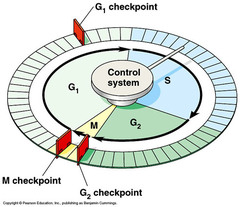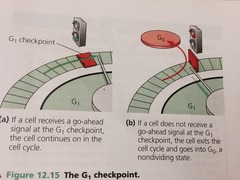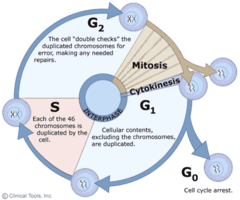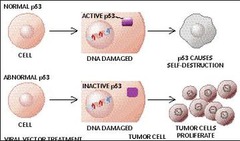Cell Cycle Control and Cancer – Flashcards
Unlock all answers in this set
Unlock answersquestion
What are cyclins?
answer
Proteins produced in synchrony with the cell cycle and they combine with certain protein kinases (CDK).
question
What do cyclins do?
answer
They control the progression of cells through the cell cycle by activating CDK (cyclin dependent kinase) enzymes.
question
What are CDKs (Cyclin Dependent Kinase)?
answer
They are a group of protein kinase enzymes that control the progress through the cell-cycle. They are only active when complexed with cyclin.
question
Why are CDKs important?
answer
They are the key driver of cell division in the cycle. They signal the cell by letting it know that it is ready to pass into the next stage of the cell cycle.
question
How do CDKs work?
answer
Cyclins bind to the CDKs, activating them to phosphorylate other molecules.
question
What are the Cell Cycle Checkpoints?

answer
They allow the cell cycle to be delayed or paused when necessary. They are used to assess its internal state and integrate external signals.
question
How are the Cell Cycle Checkpoints controlled?
answer
The passage through the checkpoints are controlled by active and inactive CDK enzymes in the cell cycle.
question
What does the G1/S Checkpoint do?

answer
It is the primary point where the cell decides to divide or not. It is also where external signals can influence events of the cycle. Growth factors affect the cycle and also the phase that links cell division to cell growth and nutrition.
question
What happens in the G2/M Checkpoint?

answer
It is the second cell-division control point, where division can be delayed if DNA hasn't been properly replicated or is damaged. -It is very complex and is important as the stimulus for the events of mitosis. -MPFs= Where CDKs are active -Passage through this checkpoint signals a commitment to mitosis.
question
What happens in the Spindle Checkpoint?
answer
It ensures that all of the chromosomes are attached to the spindle in preparation for anaphase. It is also important that they are arrayed at the metaphase plate.
question
How many Checkpoints are there?
answer
3
question
What is Cancer?
answer
An unrestrained growth and division of cells; it results from a failure of cell division control.
question
What is the p53 gene?
answer
It is a gene that produces the p53 protein that monitors DNA integrity and halts cell division of DNA damage is detected. -Many types of cancers are associated with a damaged or absent p53 gene. -If DNA is not able to be repaired, the p53 gene tells the cell to kill itself. Halting division of damaged cells. p53 prevents development of many mutated cells= Tumor suppressor gene
question
What is the Tumor Suppressor gene?

answer
Normally functions to inhibit cell division; mutated forms can lead to the unrestrained cell division of cancer, but only when both copies of the gene are mutant. -If the p53 protein is abnormal, then it fails to stop cell division and to repair DNA. The cell then divides without repair to damaged DNA(mutation). These cells continue to divide, if more damage(mutation) occurs the cell can turn cancerous.



